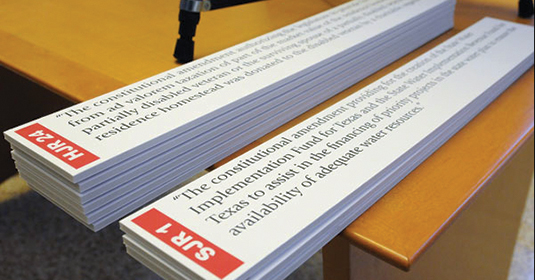By Ross Ramsey and Neena Satija | texastribune.org
 Texas voters approved a $2 billion draft from the state’s Rainy Day Fund to finance water projects in the fast-growing, drought-plagued state on Nov. 5, along with eight other amendments to the state’s constitution. That amendment, Proposition 6 on the ballot, had by far the highest profile of the nine proposals. It will move the money from the state’s savings account into a revolving account to provide public entities with low-cost loans for water supply and conservation projects.
Texas voters approved a $2 billion draft from the state’s Rainy Day Fund to finance water projects in the fast-growing, drought-plagued state on Nov. 5, along with eight other amendments to the state’s constitution. That amendment, Proposition 6 on the ballot, had by far the highest profile of the nine proposals. It will move the money from the state’s savings account into a revolving account to provide public entities with low-cost loans for water supply and conservation projects.
Campaigns led by high-profile politicians including Gov. Rick Perry; House Speaker Joe Straus, R-San Antonio; state Rep. Allan Ritter, R-Nederland; state Sen. Troy Fraser, R-Horseshoe Bay; and former state Sen. Tommy Williams, R-The Woodlands, spent more than $2 million urging voters to pass the measure.
Some conservatives disapproved of using money from that account, saying such a move encouraged “wasteful” spending and raising questions about who might benefit from state spending on water projects.
In spite of those objections, the amendment passed easily.
“Today, the people of Texas made history, ensuring we’ll have the water we need to grow and thrive for the next five decades, without raising state taxes,” Perry said on election night. “Now it’s time to get to work on the projects that’ll help us meet our growing water needs, preserving and improving both our economic strength and quality of life.”
Conservation and environmental groups also endorsed and backed the water proposition, in part because one-fifth of the money is set aside for conservation and reuse projects.
“This bold action – by both voters today and state leaders during the last legislative session – is reminiscent of the sweeping response our state made during the Drought of Record in the 1950s,” said Laura Huffman, Texas state director of the Nature Conservancy. “What is different, however, is the strong emphasis on water conservation and the critical role it will play in enabling Texas to prosper and ensuring the viability of our lakes, rivers, aquifers and coastal bays.”
Turnout was bolstered by local elections in Houston and Harris County, where Mayor Annise Parker earned a third term with a relatively easy win over a well-financed opponent, Ben Hall. Harris County voters rejected a $217 million bond measure that could have transformed the Astrodome into a special events center. Now the building, once billed as the “Eighth Wonder of the World,” could become a candidate for the wrecking ball.
Voters in Austin sent a special House election to a runoff, where Mike VanDeWalle, a Republican, will face Celia Israel, a Democrat, in a race to fill the unexpired term of former state Rep. Mark Strama, a Democrat who resigned earlier this year. The seat will be on the ballot again next year, with the winner of the regular election carrying on after the current term expires in January 2015.
Here’s a summary of the other constitutional amendments that voters approved:
Proposition 1 amends the Texas Constitution to provide property tax relief to surviving spouses of military members. Spouses of service members killed in action will be exempt from some or all taxes on their homes, as long as they haven’t remarried.
Proposition 2 eliminates the constitutional requirement for a State Medical Education Board and a State Medical Education Fund, which haven’t been operational in Texas for decades.
Proposition 3 gives tax relief to manufacturers who hold aircraft parts in their inventories in Texas for extended periods of time. Current law exempts aircraft parts from taxation if they remain in the state for up to 175 days; this measure, backed by General Electric and others, will allow localities to extend that to up to 730 days.
Proposition 4 exempts partially disabled veterans or their surviving spouses from some property taxes on their homes that were donated to them by charitable organizations. It was prompted by concerns of foreclosures on veterans who couldn’t pay the property taxes on those donated homes.
Proposition 5 authorizes reverse mortgages used to buy homes while requiring more disclosures to be given to the borrower in advance. The Texas Constitution currently only allows traditional reverse mortgages, which allow anyone aged 62 or older to borrow against the equity of their homes.
Proposition 7 allows home-rule cities in Texas to fill vacancies of elected offices by appointment instead of requiring special elections, as long as less than 12 months remain in the office’s term. The amendment is designed to lessen the burden on municipalities that may be asked to conduct special elections within just a few months of each other if elected officials leave their positions early.
Proposition 8 repeals the constitutional cap on the tax rate for Hidalgo County’s hospital district. The current maximum tax rate is far lower than other such districts across the state, and supporters said that prevented the South Texas county from establishing a viable district.
Proposition 9 expands what the State Commission on Judicial Conduct can do to discipline judges and justices in Texas. The amendment allows the commission to issue various warnings or reprimands to those under its purview after a formal hearing process, or require training, in addition to its current duties, which include issuing public censures or recommending the removal of a judge or justice. Senate Joint Resolution 42 proposed the measure, which was sponsored by state Rep. Harold Dutton Jr., D-Houston, and recommended by the state’s Sunset Review Commission.
http://www.texastribune.org/2013/11/06/election-results-headline/



